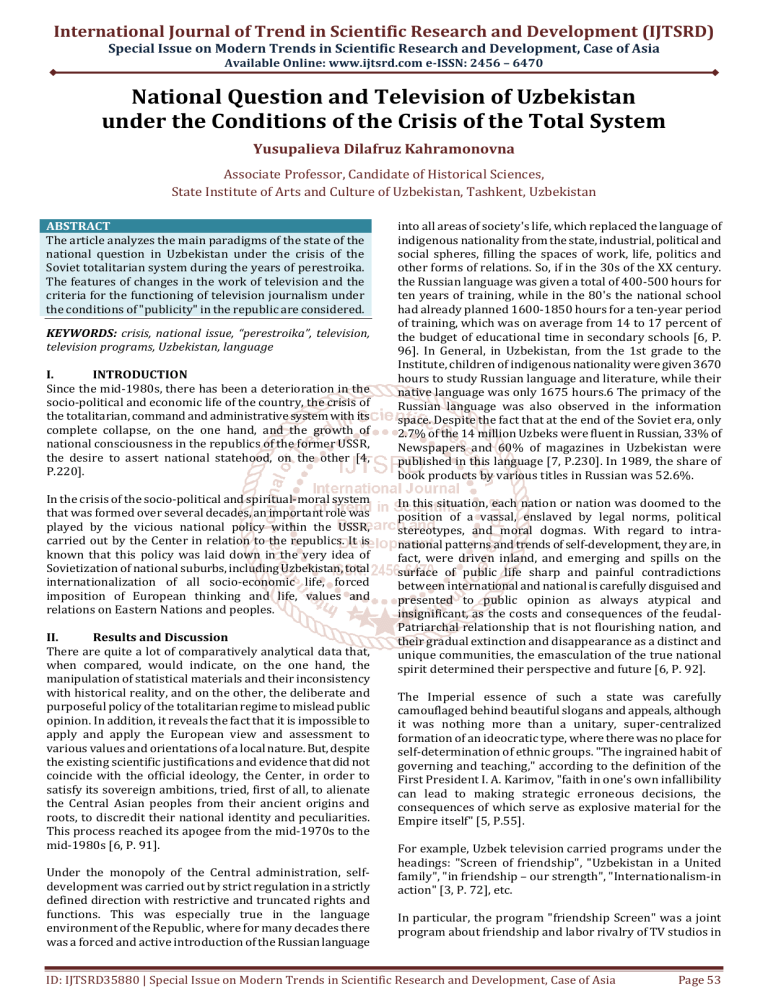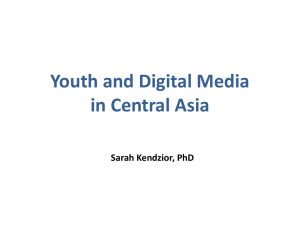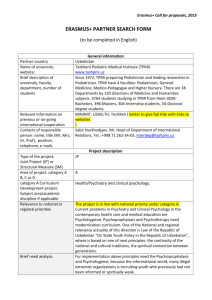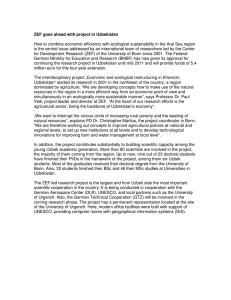
International Journal of Trend in Scientific Research and Development (IJTSRD)
Special Issue on Modern Trends in Scientific Research and Development, Case of Asia
Available Online: www.ijtsrd.com e-ISSN: 2456 – 6470
National Question and Television of Uzbekistan
under the Conditions of the Crisis of the Total System
Yusupalieva Dilafruz Kahramonovna
Associate Professor, Candidate of Historical Sciences,
State Institute of Arts and Culture of Uzbekistan, Tashkent, Uzbekistan
ABSTRACT
The article analyzes the main paradigms of the state of the
national question in Uzbekistan under the crisis of the
Soviet totalitarian system during the years of perestroika.
The features of changes in the work of television and the
criteria for the functioning of television journalism under
the conditions of "publicity" in the republic are considered.
KEYWORDS: crisis, national issue, “perestroika”, television,
television programs, Uzbekistan, language
I.
INTRODUCTION
Since the mid-1980s, there has been a deterioration in the
socio-political and economic life of the country, the crisis of
the totalitarian, command and administrative system with its
complete collapse, on the one hand, and the growth of
national consciousness in the republics of the former USSR,
the desire to assert national statehood, on the other [4,
P.220].
In the crisis of the socio-political and spiritual-moral system
that was formed over several decades, an important role was
played by the vicious national policy within the USSR,
carried out by the Center in relation to the republics. It is
known that this policy was laid down in the very idea of
Sovietization of national suburbs, including Uzbekistan, total
internationalization of all socio-economic life, forced
imposition of European thinking and life, values and
relations on Eastern Nations and peoples.
II.
Results and Discussion
There are quite a lot of comparatively analytical data that,
when compared, would indicate, on the one hand, the
manipulation of statistical materials and their inconsistency
with historical reality, and on the other, the deliberate and
purposeful policy of the totalitarian regime to mislead public
opinion. In addition, it reveals the fact that it is impossible to
apply and apply the European view and assessment to
various values and orientations of a local nature. But, despite
the existing scientific justifications and evidence that did not
coincide with the official ideology, the Center, in order to
satisfy its sovereign ambitions, tried, first of all, to alienate
the Central Asian peoples from their ancient origins and
roots, to discredit their national identity and peculiarities.
This process reached its apogee from the mid-1970s to the
mid-1980s [6, P. 91].
Under the monopoly of the Central administration, selfdevelopment was carried out by strict regulation in a strictly
defined direction with restrictive and truncated rights and
functions. This was especially true in the language
environment of the Republic, where for many decades there
was a forced and active introduction of the Russian language
into all areas of society's life, which replaced the language of
indigenous nationality from the state, industrial, political and
social spheres, filling the spaces of work, life, politics and
other forms of relations. So, if in the 30s of the XX century.
the Russian language was given a total of 400-500 hours for
ten years of training, while in the 80's the national school
had already planned 1600-1850 hours for a ten-year period
of training, which was on average from 14 to 17 percent of
the budget of educational time in secondary schools [6, P.
96]. In General, in Uzbekistan, from the 1st grade to the
Institute, children of indigenous nationality were given 3670
hours to study Russian language and literature, while their
native language was only 1675 hours.6 The primacy of the
Russian language was also observed in the information
space. Despite the fact that at the end of the Soviet era, only
2.7% of the 14 million Uzbeks were fluent in Russian, 33% of
Newspapers and 60% of magazines in Uzbekistan were
published in this language [7, P.230]. In 1989, the share of
book products by various titles in Russian was 52.6%.
In this situation, each nation or nation was doomed to the
position of a vassal, enslaved by legal norms, political
stereotypes, and moral dogmas. With regard to intranational patterns and trends of self-development, they are, in
fact, were driven inland, and emerging and spills on the
surface of public life sharp and painful contradictions
between international and national is carefully disguised and
presented to public opinion as always atypical and
insignificant, as the costs and consequences of the feudalPatriarchal relationship that is not flourishing nation, and
their gradual extinction and disappearance as a distinct and
unique communities, the emasculation of the true national
spirit determined their perspective and future [6, P. 92].
The Imperial essence of such a state was carefully
camouflaged behind beautiful slogans and appeals, although
it was nothing more than a unitary, super-centralized
formation of an ideocratic type, where there was no place for
self-determination of ethnic groups. "The ingrained habit of
governing and teaching," according to the definition of the
First President I. A. Karimov, "faith in one's own infallibility
can lead to making strategic erroneous decisions, the
consequences of which serve as explosive material for the
Empire itself" [5, P.55].
For example, Uzbek television carried programs under the
headings: "Screen of friendship", "Uzbekistan in a United
family", "in friendship – our strength", "Internationalism-in
action" [3, P. 72], etc.
In particular, the program "friendship Screen" was a joint
program about friendship and labor rivalry of TV studios in
ID: IJTSRD35880 | Special Issue on Modern Trends in Scientific Research and Development, Case of Asia
Page 53
International Journal of Trend in Scientific Research and Development (IJTSRD) @ www.ijtsrd.com eISSN: 2456-6470
Uzbekistan, Tajikistan, Turkmenistan, Kyrgyzstan and
Kazakhstan. Another television program – "Uzbekistan in the
United family", which was prepared by all the studios of the
USSR, also echoed the" friendship Screen". Its goal is to
comprehensively show the international relations of
Uzbekistan and other republics.
In all these and many other similar TV shows, it was
demonstrated that the more multinational a Republic is, the
more international it is. The crowning achievement of the
national question was the proclamation of the Soviet people
as a new social and international community.
The new generation of leaders of the former Soviet Union,
who came to power in 1985, clearly understood the need to
implement fundamental socio-economic changes in the
country. The main strategic priorities of the new policy were
the slogans "publicity" and "restructurings".
The glasnost policy provided for the "softening" of
censorship in the activities of television (under supervision
from above), as well as the publication of a number of
previously banned books and documents. To a certain
extent, the use of censorship in publishing, film production,
and theatrical performances was restricted, and films that
were previously shot but banned from being shown (put on
the shelf) were shown. With the development of glasnost,
society gained a greater form of freedom of speech. In the
end, despite all the efforts made by the party apparatus, with
its prevention is not able to cope.
Many TV shows, publications, books, films and
documentaries on previously forbidden topics (for example,
about Stalinism and repression) related to the restoration of
historical truth, contributed to the rethinking of history and
modernity, the rejection of historical and social stereotypes,
and the search for new landmarks and prospects for the
country's development. Unfortunately, the "restructurings"
was half-hearted. As a result, stagnation continued to occur
in the economic, spiritual and educational spheres, as well as
in the activities of television.
Thus, under the conditions of perestroika, most of the
broadcasts of the Tashkent city television Studio were
conducted in Russian. In addition, the Uzbek television
program information and analytical programs "Time" and
"Information" were conducted mainly in Russian. Only the
program "Information" was broadcast once a day in Uzbek.
In particular, if the editorial Board of socio-political
programs conducted 70 TV programs in 1985 alone, 58 of
them were in Russian.
In the Uzbek language was mainly cultural-educational
program "Otalarso’zi – aqlningko’zi" ("the wisdom of the
fathers – the mirror of life"), "Ertaklarolamida" (world of
tales), "Hayotquvonchlarivatashvishlari" (Joys and concerns
of life), and others.
Thus, one of the new programs "Joys and concerns of life"
gained wide popularity in Uzbekistan among millions of
viewers of various ages, as this program raised acute socioeconomic and moral problems in places.
"on the state language" in October 1989 and giving the
Uzbek language the status of the State language [1, P.12]. So,
in 1990, the number of programs prepared in Uzbek by the
editorial office of industry, construction, transport and
communications was 70%.
By the end of the 80s of the XX century, TV journalism was at
its peak. It was during these years that the first critical TV
programs appeared and “round tables” on the history and
theory of state construction began to be used. It was then
that they first started talking about “white spots”, “black
holes”and "closed cases". At numerous press conferences
held in 1987, historians opened the curtains on forbidden
topics with an irresistible fear. But soon the timid breath of
glasnost with incredible speed began to turn into a deafening
squall, and a departure from dogmatic teaching began. On
television, problems were raised, questions were asked that
literally stunned the masses. Because of this there was a
multiplicity of positions, approaches and assessments to the
Soviet national policy, only yesterday seemed unshakable
brotherhood of peoples, the principle of a single and
indivisible multinational States, the Soviet people as a new
community of people, doubt began to be very rosenast
national problems.
The media, in particular, television of the perestroika period,
trying to understand the essence of national policy, were
critical of its wording. Thus, they analyzed such definitions
as" nation"," nationalism"," national and interethnic
contradictions", "chauvinism". The appeal to these
formulations was dictated by the fact that the old
approaches to them no longer satisfied society. However, the
media in particular, television in Uzbekistan, as well as all
public thought, have developed slowly, with a lot of caution,
with less freedom and frankness. And yet, even with
difficulties, the process of rectification of consciousness was
going on.
The developed program "For political and economic
sovereignty, spiritual renewal, social justice and decent
living conditions of the population of Uzbekistan" played an
important role in this, [2] which for the first time revealed
the content of the concept of "full independence at the
Republican level". This program contained the task of
transition to market relations. She advocated independence
in foreign economic activity, expanding and strengthening
the Republic's position in the world market, creating the
necessary conditions for attracting foreign investment and
technology, etc. [2].
In this direction, the television of the Republic saw regional
self-financing and self-financing as a starting point for the
gradual introduction of market relations. Therefore, much
space was given to this problem in TV shows. But not all of
their materials met the requirements of modern Economics.
Numerous discussions on television about regional selffinancing and self-financing have largely contributed to the
fact that new forms of management rent, contract,
cooperation, etc. they have already been introduced into
everyday production practice. Of course, they did not
develop along a straight, post road, but overcame numerous
obstacles of a bureaucratic, economic and psychological
order.
The situation changed in favor of the Uzbek language only
after the adoption of the Law of the Republic of Uzbekistan
ID: IJTSRD35880 | Special Issue on Modern Trends in Scientific Research and Development, Case of Asia
Page 54
International Journal of Trend in Scientific Research and Development (IJTSRD) @ www.ijtsrd.com eISSN: 2456-6470
The problems of the market, the transition to it, and the
correlation between the concepts of "socialism" and
"market" caused a violent reaction from almost all segments
of society, which was largely fueled by the media. On
television there were programs "Discussion platform",
"Problems of transition to the market", "Economic reform:
theory and experience", "Discussion and discussions", etc.,
where public figures, government officials, scientists,
economists, specialists in various sectors of the national
economy spoke. They expressed not only their point of view
on any issue, but also offered their vision, their concept of
transition to a market economy.
III.
CONCLUSION
The term "regulated market" did not leave the materials of
TV shows. During these years, such stereotypes as "socialist
choice" and "planned economy" were defended on television.
Ideological formulations derived from the idea of total
equality reinforced these stereotypes. Although it should
have been obvious that it is impossible to change the system
within the framework of a socialist choice: there is no
"socialist" or "capitalist" market, but there is a single and
indivisible mechanism developed by a universal civilization.
List of sources used:
[1] Bulletin of the Supreme Council of the Republic of
Uzbekistan. - Tashkent, 1990, No. 22.
[2]
Evening Tashkent (newspaper), 1990, December 26.
[3]
Esenbaev Z. I. Ernazarov T. E., Ibragimov U. Ya. Mass
media and propaganda of Uzbekistan. - Tashkent,
"Uzbekistan", 1979.
[4]
History Of Uzbekistan (1917-1991). Ed. Alimovoy D.
A.-Tashkent, "Shark", 2002.
[5]
Karimov I. A. Uzbekistan on the threshold of the XXI
century: security threats, conditions and guarantees
of progress. - Tashkent, "Uzbekistan", 1997.
[6]
Legal state-independence, nation, economy, ideology,
politics. Volume I. Tashkent, 1994.
[7]
Social development of the USSR. Stat. sat. - M., 1990.
ID: IJTSRD35880 | Special Issue on Modern Trends in Scientific Research and Development, Case of Asia
Page 55




